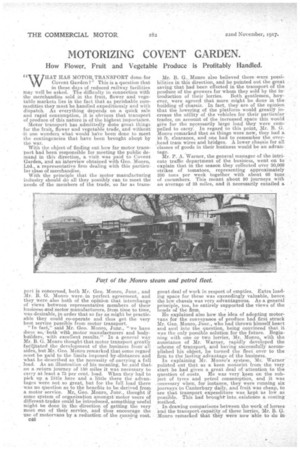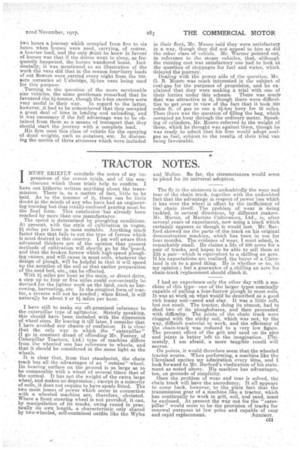• MOTORIZING COVENT GARDEN.
Page 20

Page 21

If you've noticed an error in this article please click here to report it so we can fix it.
How Flower, Fruit and Vegetable Produce is Profitably Handled.
HAT HAS MOTOR, TRANSPORT done for Covent Garden?" This is a -question that in these days of reduced railway facilities may well be asked. The difficulty in connection with the merchandise sold in the fruit, flower and vegetable markets lies in the fact that as Perishable commodities they must be handled expeditiously and with dispatch. As everything depends on a quick sale and rapid consumption, it is obvious that transport of produce of this nature is of the highest importance. `Motor transport has admittedly done great things for the fruit, flower and vegetable trade, and without -it one wonders what would have been done to meet the contingencies that have been brought about by the wan
With the object of finding out how far motor transport had been responsible for meeting the public demand in this direction, a visit WKS paid to Covent Garden, and an interview obtained With Geo. Monro, Ltd., a representative firm dealing with this particular class of merchandise.
With the principle that thc motor manufacturing industry should do all they possibly can to meet the needs of the members of the trade, so far as trans port is concerned, both Mr. Geo. Monro, Junr., and Mr. P. G. Monro were. in perfect agreement, and they were also both of the opinion that interchange of views between • representative members of their business. ancl.motar manufacturers, from time to time, was desirable, in order that so far as might be practicable they could co-operate and thus get the very best service possible from motor transport. " In fact," said Mr. Geo. Monro, Junr., " we have done. so, both with motor manufacturers and bodybuilders, with excellent results." In a general way Mr. B. G. Monro thought that motor transport greatly faCilitated the development of the business from all sides, but Mr. Geo. Monro remarked that some regard most be paid to the limits imposed by -distances and what he described as the necessity of.carrying a full load. As an illustration of his meaning, he said that
on a return journey of 150 miles it was necessary to carry at least a 75 per cent, load. When they had to pick up a little here and a little there the advantages were not so great, but for the full load there
• was no question as to the benefits to be derived from a motor service. Mr. Geo. Vloiaro, Junr.. thought if • some system of organization amongst motor users of clifferenttrades could be introduced, something useful might be done in the direction of getting the very most out of their service, and thus encourage the use of motorvans by a reduction of the running cost. C46 Mr. B. G._ Monro also believed there were possibilities in this direction, and he pointed out the great saving that had been effected in the transport ot the produce of the growers for whom they sold by the in
troduction of their lorries. Both gentlemen, however, were agreed that more might be done in tlie•
of' chassis. In fact, they are of the opinion that the lowering of the platformwould greatly increase the utility of the vehicles for their particular trades, on account of the increased space this would give for the necessarily large load they were compelled to carry. In regard to this point, Mr. B. G. Monro remarked that as things were now, they bad a 16 ft. clearance, and one had to remember the overhead tram wires and bridges. A lower chassis for all classes of goods in their business would be an advantage. Mr. P. A. Warner, the general manager of the intricate traffic department of the business, went on to explain that in the season they collected over 30,009 strikes of tomatoes, representing approximately 200 tons per week together with about 60 tans of cucumbers. This meant about 90 journeys with an average of 33 miles, and it necessarily entailed a great deal of work in respect of empties. Extra loading space for these was exceedingly valuable, hence the low chassis was very advantageous. As a general principle, too, he entirely supported the views of the heads of the firm.
He explained also how the idea of adopting motorvans for the conveyance of produce had first struck Mr. Geo. Monro, Junr., who had thrown himself heart and soul into the question, being convinced that it was the only possible solution for the future. Beginning with one or two lorries, Mr. Monro, with the assistance of Mr. Warner, rapidly developed the scheme of transport, and baying successfully accomplished his object, he turned the fleet over to the firm to the lasting advantage of the business. In explaining Mr. Monro's system, Mr. Warner pointed out that as a keen motorist from the very start he had given a great deal of attention to the question of .costs. He was very keen on the subject of tyres and petrol consumption, and it was necessary when, for instance, they were running six journeys to Canterbury daily, and fruit was cheap, to see that transport expenditure was kept as low as possible. This had brought into existence a costing method.
In drawing comparisons between the work of horses and the transport capaZity of these lorries, Mr. B. G. Monro rerna.rked that they were now 'able to do in.
two hours a journey which occupied from five to six hours when horses were used, carrying, of course, a heavier load, and the only jleint he knew in favour of horses was that if the driver went to sleep, as frequently happened, the horses wandered home. Incidentally, it was mentioned as an illustration of the work the vans did that in the season fourglorry loads of cut flowers were carried every night from the 100acre nurseries at -Uxbridge, 31-ton vans being used for this purpose.
Turning to the question of the more serviceable size vehicles, the same gentleman remarked that he favoured the 31-tonner, though the 5-ton carriers were very useful in their way. In regard to the latter, however, it had to be remembered that they occupied a great deal of time in loading and unloading, and it was necessary if the full advantage was to be obtained from them as a means of transport that they should start the journey with a complete load.
His firm used this class of vehicle for the carrying of dead weights, such as -potatoes, -etc. In discussing the merits of three 'Steamers which were included
in their fleet, Mr. Monro said they were satisfactory in a way, though they did not appeal to him as did the other class of vehicle. Mr. Warner pointed out, in reference to the steam vehicles, that, although the running cost was satisfactory one had to leek at the question of stoppages for fuel and water, which delayed the tourney. Dealing with the power side of the question, Mr. G. B. Monro was much -interested in the subject of coal-gas for the purposes of propulsion, and he explained that. they were making a trial with one of their lorries under this scheme. There was muclr that was attractive in it, though there were difficulties to get over in view of the fact that it took 500 cubic ft. of gas to run a 31-ton lorry for 16 miles. Then there was the question of filling the bag, which occupied an hour through the ordinary meter. Speaking of cylinders, Mr. Monro referred to the weight of these, which he thought was against them, though he was ready to admit that his firm would adopt coalgas as fuel, subject to the results of their trial van being favourable.


























